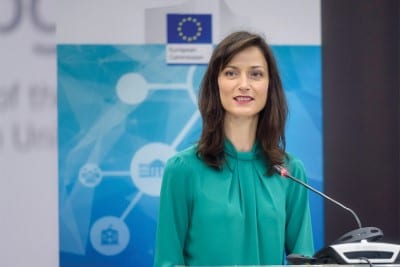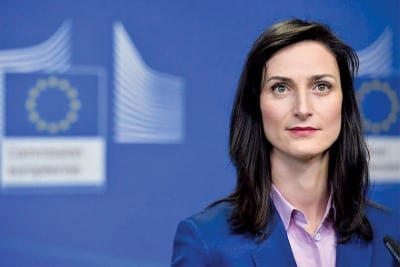We need to work together to enhance the skills of our citizens of all ages and backgrounds. The region needs well-trained workers with the proper digital skills to match the demands of this new economy
To provide the region with support for carrying out the digital transformation process as quickly as possible, the European Commission launched its Digital Agenda for the Western Balkans. The aim of this initiative, alongside ensuring the more efficient digitalisation of industry, the advancement of the digital economy and improved cybersecurity, is also to accelerate growth in innovation and research – notes Mariya Gabriel, European Commissioner for Digital Society and Economy, in this exclusive interview for CorD, whilst she also emphasises the importance of training and education along the way.
“Improved connectivity is not enough though, as the real gains come when you invest in people,” says Commissioner Gabriel.
During a recent visit to the Science and Technology Park in Belgrade, you expressed great satisfaction with the way in which Serbia used grant funds in the field of science and technology. From next year, the EU is also taking over the financing of STP for €1.5 mill. How do you foresee the future of our country’s partnership with the EU on this project?
The science and technology park is a good example of cooperation, aimed at ensuring positive deliverables. The EU assistance of € 1.5 million will be provided to the STP Belgrade to upgrade the set of standardised business support services and to create tailor-made services, with the purpose of supporting companies in each phase of their development – from identification of business idea and start-up to growth and internationalisation.  The aim is also to modernise the organisation of research and innovation and to stimulate cooperation between industry and academia as well as to increase the level of investment in research. The project should start in 2019.
The aim is also to modernise the organisation of research and innovation and to stimulate cooperation between industry and academia as well as to increase the level of investment in research. The project should start in 2019.
Bringing together some of the brightest young teams in the country in one place is bringing benefits, ensuring that what is created in Serbia can grow in Serbia. I also want to bring together some of the brightest teams in the the Western Balkans to Sofia on 15th November, during the Start-Up Summit, where we aim to create a network among start-ups from the region with start-ups from Central and Eastern Europe, helping people learn lessons and exchange experiences, so they can grow and create jobs.
Do you think that Serbia needs to decentralise such projects, or expand innovation centres to smaller towns?
Yes, I think it does. And not just in Serbia. But then I also believe that the Serbian government is well aware of this need as well and is already taking steps to address it. I understand that up until now most investments in projects such as this have been in three main urban areas (and in this Serbia is no different than many other countries), but the focus is now shifting to smaller cities, and this is a welcome development. We would like to create digital innovation hubs in every region and for those to cooperate to avoid unnecessary duplications.
The growth of innovation and research, with the faster digitalisation of industry, advancement of the digital economy and better cybersecurity are among the goals of the Digital Agenda for the Western Balkans, launched in June 2018 in Sofia. What does this agenda define, so that the region will feel the benefits of digital transformation as quickly as possible?
The principal aim of the Digital Agenda for the Western Balkans is to ensure that the countries in this region – with their close proximity to the EU and, in many cases, their ambitions to become part of the EU at some point in the future – can benefit from the digital transformation that we are trying to foster within the EU itself.
Bringing together some of the brightest young teams in the country in one place is clearly bringing benefits, ensuring that what is created in Serbia can grow in Serbia
The Agenda will mean closer cooperation between the EU and the Western Balkans on key issues such as broadband infrastructure, public sector modernisation and the digitalisation of industry, digital skills and cybersecurity. The ultimate aim is to support the partners in the region to succeed and citizens and the business to benefit from the digital transformation. We can see from our own experiences in the EU that a functioning digital infrastructure is a fundamental prerequisite for the success of any country or region to benefit from the digital transformation.
The European Commission is, therefore, supporting the roll-out of high-speed broadband to the Western Balkan countries: under the Western Balkan Investment Framework (WBIF), €30 million in EU grants has been made available for the period 2018-2020 to encourage the roll-out of broadband infrastructure in the whole region. It is vital that all partners identify good projects and grasp this opportunity.
Another key area is cybersecurity and trust. The EU and the Western Balkan region have a common objective to improve online security and trust, and I am pleased to say that all of the governments in the region have pledged to align with the EU’s rules on the security of network and information systems. It will mean, for example, creating their national cybersecurity strategies as well as computer security incident response teams.
 As for the general digitisation of societies and economies, all companies in Europe – in the EU and the Western Balkans alike – will need to digitise in order to remain competitive. They need to innovate their production processes, business models and products using digital technologies such as artificial intelligence, the blockchain, 3D printing, data analytics, and so on. We see that while many large companies are investing in their digital transformation, most small ones are not. Indeed, only one in five companies in Europe is highly digitised.
As for the general digitisation of societies and economies, all companies in Europe – in the EU and the Western Balkans alike – will need to digitise in order to remain competitive. They need to innovate their production processes, business models and products using digital technologies such as artificial intelligence, the blockchain, 3D printing, data analytics, and so on. We see that while many large companies are investing in their digital transformation, most small ones are not. Indeed, only one in five companies in Europe is highly digitised.
To address this challenge within the EU, the European Commission and the Member States are investing in Digital Innovation Hubs, as mentioned earlier. These hubs are offering a set of services to companies – especially SMEs (including start-ups) and mid-caps – to support their digital transformation. The Western Balkans are facing similar problems as the European Union with the digitalisation of their industry, and Digital Innovation Hubs could certainly benefit companies in that region as well. In fact, some Serbian and Macedonian companies have already benefited from the DIH initiatives within the EU, and I fully expect to see more companies do so in the future.
In the end, the ultimate goal of the Digital Agenda for the Western Balkans is to create an environment where citizens can truly benefit from all benefits that digitisation can bring. Another area where citizens in the region can expect to see change is with regard to their public administrations.
Improved connectivity is not enough though; the real gains come when you invest in people. We need to enhance together with the skills of our citizens of all ages and backgrounds. The region needs well-trained workers with the proper digital skills to match the demands of this new economy. The sixth edition of EU Code Week took place from 6th to 21st October. My objective is to reach 50% of all schools in Europe by 2020. In this context, it is crucial that Western Balkan partners be fully involved in such initiatives.
If change is what drives society, then innovation is what drives change. And today more than ever, innovation is driven by start-ups. A handful of big players might dominate the global tech sector, but much of the best innovation still comes from small companies with big ideas. Start-ups in the EU get support in a variety of ways, such as through Start-up Europe, an initiative of the European Commission designed to connect start-ups, investors, accelerators, entrepreneurs, corporate networks, universities and the media through an array of networks. Start-up Europe is open to Western Balkan countries.
One of the priorities in the Digital Agenda of the Western Balkans is the reduction of roaming prices. Are there certain arrangements already made and can we soon expect a clear schedule when and by how much calls and SMS roaming charges will be reduced?
This is indeed a key priority of the Agenda. The current regional roaming agreement has already provided clear benefits to citizens in the four countries it covers: prices have fallen, and data usage has risen, reflecting the increasing use of digital by businesses and consumers. But a new regional roaming agreement is needed that covers the six partners in the region, expanding from Serbia, Montenegro, Bosnia and the Former Yugoslav Republic of Macedonia to Albania and Kosovo as well, and will progressively move towards even lower prices. We are working with partners on this new agreement.
The Western Balkans are facing similar problems as the European Union with the digitalisation of their industry, and Digital Innovation Hubs could certainly benefit companies in that region as well
The plan is that by 2019 the cost of megabytes in roaming will be 70 cents, falling to 20 cents by 2021. This should be carefully managed so that it balances the local telecoms operators’ need to invest in further digital developments while delivering lower prices for consumers. The intention is to have the new regional roaming agreement ready by the BEREC session in December in Prague, ahead of the official signing by leaders of the region at the next Digital Summit in Serbia in April next year.
Speaking of cybersecurity, the event of the year is certainly the entry into force of the General Data Protection Regulation (GDPR). Could citizens breathe a sigh of relief and does this act cover most of the cases related to data manipulation?
The GDPR modifies and updates data protection rules at the EU level to make Europe fit for the digital age, benefiting both citizens and businesses. The Facebook/Cambridge Analytica case and the more recent Facebook and Google data breaches highlight the clear need for EU-wide data protection rules. Compared to the previous regulations and principles, there are some important novelties in the GDPR.

People now have easier access to their data, the right to transfer it from one service provider to another – for example a bank or mobile provider – as well as a clarified right to be forgotten online and the right to be informed quickly if their data is lost or disclosed.
There are indeed plenty of reasons for citizens to feel reassured that their data is now well-protected thanks to GDPR, which offers a range of measures to prevent and sanction data protection breaches. Any organisation found to be in breach of GDPR risks fines of up to 2% or 4% of its global turnover, depending on the seriousness of the infringements.
Even though these maximum amounts would only be levied in the most serious of cases, we can already see that they are a clear deterrent.
The prescribed penalties in the EU are very high. Are there cases in which they are already being enforced?
It is the job of the independent data protection authorities of the Member States to monitor and enforce the GDPR. They must judge each alleged breach of the rules on its own merits, and according to 11 different factors set out in the regulation.
The plan is that by 2019 the price of megabytes in roaming will be 70 cents, falling to 20 cents by 2021
These include the seriousness/ duration of the violation, the number of data subjects affected and level of damage suffered, any actions taken to mitigate the damage and the extent to which the organisation in breach of the rules has co-operated with the supervisory authority. Since the regulation only started to apply earlier this year, it is still too early to expect very prominent cases of sanctions. Many of the authorities tell us that they have certainly seen an increase in the number of suspected cases of data protection breaches reported to them since the new rules started to apply.
On the other hand, businesses across Europe – perhaps the SME sector most, often find that the application of the GDPR is complicated. Do they have any reason to be concerned about their competitiveness and development?
I am well aware that SMEs in some Member States are concerned that applying the GDPR will prove to be too burdensome and expensive. The Commission is, of course, ready to help any company, large or small, to understand what it needs to do to meet the new data protection requirements. Much of the information they need is already available on the Commission’s website, including the seven simple steps that need to be followed to prepare for applying the GDPR. Of course, the Commission is also closely monitoring the situation and will report on the application of the GDPR and possible problem areas next year.
 It is also important that the way the GDPR is applied does not depend on the size of the company or organisation but the nature of its activities. Putting it simply, if a company’s activity carries a high risk to people’s rights and freedoms, the rules they have to comply with will be more stringent. For most SMEs that do not have data processing as their core business and that were already compliant with the previous data protection regime, the GDPR does not create many new obligations, and therefore they should not be worried about any negative impact on their competitiveness and development.
It is also important that the way the GDPR is applied does not depend on the size of the company or organisation but the nature of its activities. Putting it simply, if a company’s activity carries a high risk to people’s rights and freedoms, the rules they have to comply with will be more stringent. For most SMEs that do not have data processing as their core business and that were already compliant with the previous data protection regime, the GDPR does not create many new obligations, and therefore they should not be worried about any negative impact on their competitiveness and development.
Thanks to the SDM Strategy of 2015, the Union has established a regulatory framework adapted to the digital age, and in May this year, the EC proposed the establishment of the first Digital Europe programme for the next EU multi-annual budget to increase competitiveness internationally and develop and strengthen European strategic digital capacities. What areas does this proposal target?
A truly integrated European Digital Single Market is a pre-condition to enable the European digital sector to be competitive at world level. In the last few years, we have made close to 60 initiatives, including 29 legislative proposals on data flows, cybersecurity, copyright, consumer protection, VAT, telecom regulation or online platforms. The good news is, a significant part of these proposals have already come into force or are about to do so.
However, we also need to step-up significantly our budgetary effort to ensure our technological leadership and autonomy. European digital businesses have to invest – and we have been helping them to do this notably through the European Fund for Strategic Investments and the Capital Markets Union. In parallel, we need to scale up public investments. Under the Digital Europe programme, were are proposing to invest €9.2 billion over the seven years from 2021 to 2027 in core digital capacities: high-performance computing, artificial intelligence, cybersecurity, advanced digital skills and support to public administrations.
The way the GDPR is applied does not depend on the size of the company or organisation but on the nature of its activities
Our proposal is built around five core elements. There is a proposed €2.7 billion to fund projects in supercomputing and data processing in Europe, which is crucial for the development of many areas – from health care and renewable energy to car safety and cybersecurity. Then there will be €2.5 billion to help spread AI across the European economy and society, including the development of common ‘European libraries’ of algorithms that would be accessible to all, and to help the public and private sectors to identify and acquire whichever solution would work best for their needs.
For cybersecurity and trust we are proposing a budget of €2 billion that will be invested in safeguarding the EU’s digital economy, society and democracies through boosting cyber defence and the EU’s cybersecurity industry, financing state-of-the-art cybersecurity equipment and infrastructure as well as supporting the development of the necessary skills and knowledge. Some €700 million will be set aside for boosting advanced digital skills.
Finally, €1.3 billion will ensure the digital transformation of public administration and public services and their EU-wide interoperability and facilitate access to technology and know-how for all businesses, in particular, SMEs, using the network of Digital Innovation Hubs, one-stop shops providing access to technological expertise and experimentation facilities.
There will also be funding support for digital action through two other EU programmes. Digital infrastructure projects will benefit from €3bn available under the Connecting Europe Facility, while research and innovation in next-generation digital technologies will be supported with around €16 billion from the Horizon Europe programme.
| COOPERATION
The science and technology park in Belgrade is a good example of collaboration, aimed at ensuring positive deliverables |
IDEAS
A handful of big players might dominate the global tech sector, but much of the best innovation still comes from small companies with big ideas |
PROTECTION
Citizens have plenty of reasons to feel reassured that their data is now well-protected thanks to GDPR, which offers a range of measures to prevent and sanction data protection breaches |
|---|